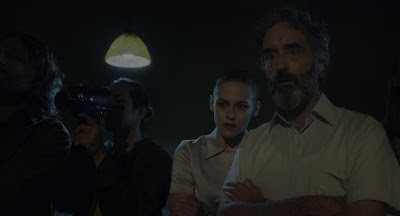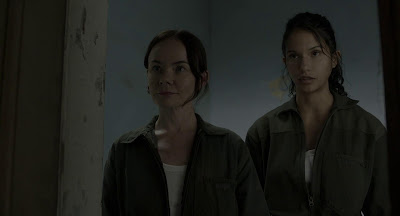Crimes of the Future revolves around the lives of two performance artists. Saul Tenser (Viggo Mortensen) has a disorder that means his body rapidly grows vestigial organs. His partner in life and business, Caprice (Léa Seydoux), cuts his chest open and removes them in live surgical demonstrations in front of small but appreciative audiences. Tenser’s ever altering anatomy has a downside. He’s in constant pain, hunched over in his Jedi cloak and speaking in a rasped voice. Seydoux’s Caprice is theatrical when emceeing the dissections and oozes a sensual charisma in nearly every scene.
While some technology has evolved – we see novel ring cameras and semi-organic contraptions to help people in pain get off to sleep and conduct robotic surgery – director and screenwriter David Cronenberg quickly establishes that cruise ships now lie capsized and rusting in shallow waters. People walk everywhere, live in drab blue/grey buildings that are decaying, use old laundry machines, and keep paper records. There’s none of the glitz, and only a fraction of the budget, of Blade Runner.Several figures are introduced into the narrative to act like societal pathologists, poking and prodding at the ethics and morality of this new world. Wippet (Don McKellar) and Timlin (Kristen Stewart) run the nascent National Organ Registry that documents new organs to build an audit trail in case they should lead to harmful, uncontrolled evolution. Yet the kind of people drawn to police the new world order are also attracted to understand the wider world of inner surgical enhancement, with anti-establishment evolution activists adding another layer of understanding. Meanwhile, the authorities ignore the confession to an actual serious crime.
Cronenberg doesn’t disappoint in his construction of a miniature future world that puts today’s society under the microscope: consent; being comfortable in your skin and your self; health concerns about ingesting industrial waste and plastics; self-harm and cosmetic surgery together with concepts of conventional beauty and the need for validation; different ways of finding pleasure; assisted dying; and the age-old chestnut of how progress can always be exploited for evil … though definitions of what is evil will vary. There’s a lot packed in. Anthropology students will be churning out dissertations about Crimes of the Future for many semesters to come.
Aside from throwing out large questions to be pondered on the way home from the cinema, Cronenberg also creates moments that are beautiful in themselves without the need for extraordinary brainpower to process what’s going on. Watch out for the delightful duo of mechanics (Nadia Litz and Tanaya Beatty) who have a tool for every occasion.Timlin/Stewart’s ability to invade someone’s personal space is a joy to behold. And there’s an argument about the aesthetics of a tattoo that feels like a universal nod to human obsession with style. While bodies are evolving – naturally and forced – the human instinct to find pleasure and find freedom from pain are still alive and well, though while “old sex” is apparently less commonly practiced, gazing lustfully at naked bodies hasn’t been strained out of the genetic soup.
The dialogue is stuffed full of pithy maxims, as if some of the issues are being talked about for the first time by the participants rather. It’s not terribly natural, but it does quickly establish the concepts Cronenberg wants to explore. The film’s ending is somewhat abrupt, finishing off the story rather than making an attempt to draw the subject to any conclusion other than ‘deep down, humans never really change’.
To compare Crimes of the Future with an extended episode of Black Mirror would be to diminish the world-building, painstaking set design, and the plethora of ideas and concepts chewed over in the 107 minute film. Yet Cronenberg’s 2022 offering is less shocking, gory and upsetting than it might have been 15 or 20 years ago. And while the surgery may not be to the taste of anyone who is very squeamish, to be honest the amount of blood is minimal, and people’s organs look very like sausages.
Crimes of the Future is screening at the Queen’s Film Theatre from Friday 9 September.
Enjoyed this review? Why click on the Buy Me a Tea button!



No comments:
Post a Comment